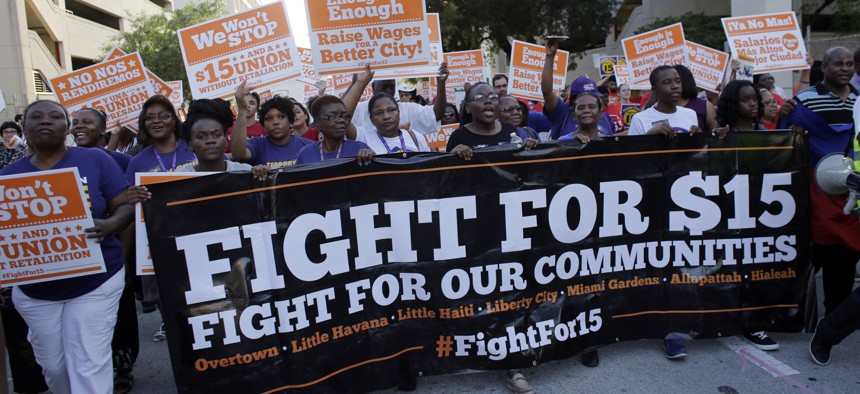These Cities Raised Wages for Municipal Workers to $15 an Hour

In this April 15, 2015, file photo, protesters march in support of raising the minimum wage to $15 an hour as part of an expanding national movement known as Fight for 15, in Miami. AP Photo/Lynne Sladky
To attract and keep employees in a tight labor market, some local governments are bumping up hourly pay.
Help wanted signs advertise $15 an hour wages at restaurants, grocery, and retail stores—reflecting the high demand for workers since the U.S. economy roared back to life.
And they’ve brought a reckoning to city hall.
Like many businesses, local governments are struggling to recruit and retain workers. To address the workforce shortage, at least three cities—Milwaukee, New Orleans, and Tallahassee—have recently increased the minimum wage for municipal employees to $15 an hour.
Milwaukee began paying higher wages to approximately 450 workers, ranging from crossing guards to office assistants, at the end of September, said Makda Fessahaye, director of the city’s Department of Employee Relations.
Previously, some workers had made as little as $8 an hour. About half of the workers who will get raises are minorities or women, she said.
“This is something we strongly believe in because not only is it the right thing to do, but it will help us with our recruitment and retention efforts for the city of Milwaukee,” Fessahaye said during a hearing in June on the proposal. “We have come to realize especially during the pandemic that a living wage is really necessary to survive.”
The increase will cost the city $1.4 million a year, but officials expect departments to be able to offset the costs within their own budgets, she said.
Much of the municipal discussion around a $15 minimum wage has been focused on the private sector and providing workers a living wage, said Brooks Rainwater, senior executive and director of the National League of Cities’ Center for City Solutions. But the tight labor market has pushed the private sector to increase wages, in many cases created a de facto $15 an hour minimum wage even without state and local mandates. The fact some cities are focused exclusively on raising wages for their own employees speaks to the workforce issues they have encountered during the pandemic, Rainwater said.
“There is a really strong focus on retaining and attracting talent,” he said.
Facing worker shortages, other state and local governments have offered hiring bonuses for certain hard-to-fill positions and others are embracing remote work as a way to compete.
For many lawmakers and city officials, increasing municipal salaries is about fairness.
New Orleans Councilmember Jared Brossett, who sponsored legislation to raise wages there, said the driving force behind doing so is to create a more equitable city.
“We know there is an affordable housing crisis here and around the country. No family can live off $7.25,” he said in a statement after the bill’s passage, citing the federal minimum wage. “While there is so much work to do to create a more equitable city this is a big first step city workers deserve to not just scrape by, but thrive in the city they so graciously serve.”
The New Orleans City Council voted in October to increase the minimum wage for city workers from $11 to $15 an hour. The wage hike will go into effect next year. A wage hike affecting city contractors will take effect in 2023.
A spokesman for Mayor LaToya Cantrell said the municipal worker wage increase would cost the city about $10.2 million a year.
The Tallahassee City Commission also approved a plan this summer to raise the minimum wage for municipal workers to $15 an hour.
The ability to raise municipal wages will vary from larger cities to smaller municipalities. It would likely be much more costly to enact a $15 an hour minimum wage in a state that does not set its own minimum wage and uses the federal government’s $7.25 wage, than in a state that has a higher wage in place, Rainwater said.
When municipalities have raised the minimum wage for businesses, it tends to create a ripple effect that increases wages in surrounding areas, Rainwater said, expecting the same could be true for municipal worker wages. If cities are not in the financial position to raise wages right away, Rainwater said they could look to phase in those increases over time.
Andrea Noble is a staff correspondent with Route Fifty.
NEXT STORY: 'An Absolutely Fascinating' Local Government Job





